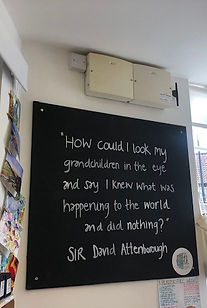
GREEN PROFILES
Pollarded willow, Thirsk
Green Profile #1
Earth Unwrapped, Northallerton
Susan Ganderton-Jackson
Whether it’s a corner shop or a PLC, we think that local businesses doing their bit for the environment deserve some recognition. For our first Green Profile, Thirsk FoE’s roving reporter Megan called in at Earth Unwrapped in Northallerton High Street.
Name: Earth Unwrapped
Where: 139 High Street, DL7 8PE
Opening Times: Wednesday-Friday 9:30-3:30 Saturdays 9-3:30 at the moment.
Social Media: Facebook and Instagram
Stocks: Refills of food such as cereal, dried fruit, lentils, rice, pasta, noodles, nuts, herbs, spices, tea and coffee. Non-food refills such as shampoo, shower gel, cleaning products, handwash and dishwasher. There are also reusable products such as bottles, cups, beeswax wraps etc.
What are your most popular products? Basics such as porridge oats, pasta, and my locally made granola which is more of a treat product.
What is your favourite product? The products that give me the most satisfaction are those I used to buy regularly in plastic packaging, so I don’t see it in my bin or recycling.
How long have you been open? 2 ½ years. I was the first shop in the North Yorkshire area apart from in York.
What was your motivation for opening? I used to work as a management consultant, and I never used to think about the environment because it was such a fast-paced job. This all changed when I had a granddaughter, and I slowed down a bit. One day, before school, she was drawing a picture of what was obviously a fish and a bin, and I asked what it was. She said it was “all the fish trapped under the sea by the plastic”. So, I started thinking really hard about my consumerism, I was annoyed that we didn’t have any refill shops locally, so I thought why don’t I do it then?
What have your main challenges been? Covid has had a huge effect on footfall. At the beginning it was manic because I had flour and toilet roll, then it slowed down. I had to close for a bit to make the shop Covid-secure. Shopping habits have changed. People come less frequently but stock up more, and footfall is unpredictable. I have been lucky to be able to stay open, though – unlike some other shops.
How’s your collaboration with Kristina’s going? That gets more popular every month. At first it was her friends who wanted to try it, and now there’s more and more people – and people trying more things. It also helps people who would have had to drive to Northallerton for certain refills as well as reducing pollution.
Do you have any aspirations to grow your business? Have you thought about expanding online? I would need to have more staff and to have that I need more customers. I also don’t have time, as I’m always busy in the shop – refilling things and doing paperwork, for example. At the moment the business isn’t in a position to expand, but you never know. I would love to have more space to get more products with a different selection. I already have 60-70 products.
Would you agree that eco-friendly products are more expensive? Are some more expensive than others? I do price checks with supermarkets. I’m really competitive. Some things I can’t price check, such as the locally sourced granola. The last time I checked against branded products, though, it worked out the same or cheaper. Most of the time, if you already buy a named product, you will find it cheaper to do refills, and it is much more environmentally friendly. The odd product is expensive, but it would be expensive at a supermarket as well. As for reusable products, if you buy a reusable cup and use it many times instead of a disposable one it’s not just the environment you’re saving but your money as well; it pays itself back. Also, when you buy a product, you need to think about the company you are supporting, what they invest in and if they test on animals. Most big companies don’t care.
What is the ecological cost of choosing the cheaper or branded product? It’s not just an environmental cost, it’s a moral cost, it’s a people cost, it’s a problem in the supply chain. Some big companies have really unethical practices. It’s dreadful! I know some people have no choice but to buy cheaper, ‘value’ products, but I’d encourage people who can afford to buy the branded items to think carefully about which company they buy from. I often think people are educated by their children. It would be great to make sustainable living more mainstream. It should be seen as the norm.
How difficult is it to source eco-friendly products and where do they come from? I always research where they come from. Inevitably some things come from abroad, but I always try to choose the best option. Luckily, the small companies I buy from have also done their own research into the supply chain. Where I can buy locally, I do so. For example, my beeswax wraps are made from organic cotton, made locally and with local beeswax. I also have plantable cards made by a local artist. Of course, some materials such as bamboo have to be imported, but I still do the research into where this comes from.
How do some of your products help people to save money? You’ll save money massively with herbs and spices, especially for people who can’t afford other products. This is a good start. Most of my customers say they are surprised at how much they have saved. There is less food waste as well, because people only buy what they need. If you can afford to have a reusable product, of course, that will save you money in the long run.




